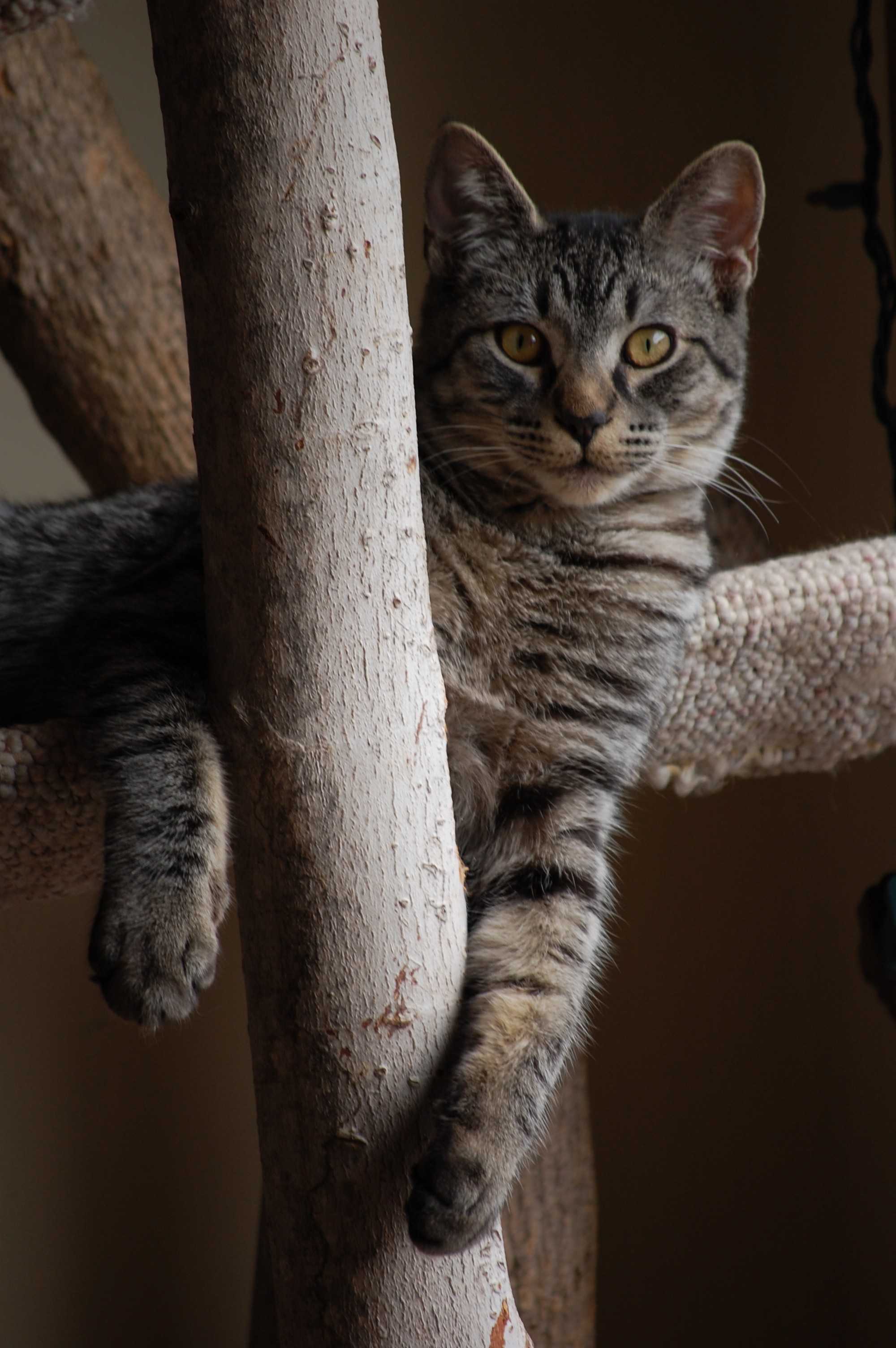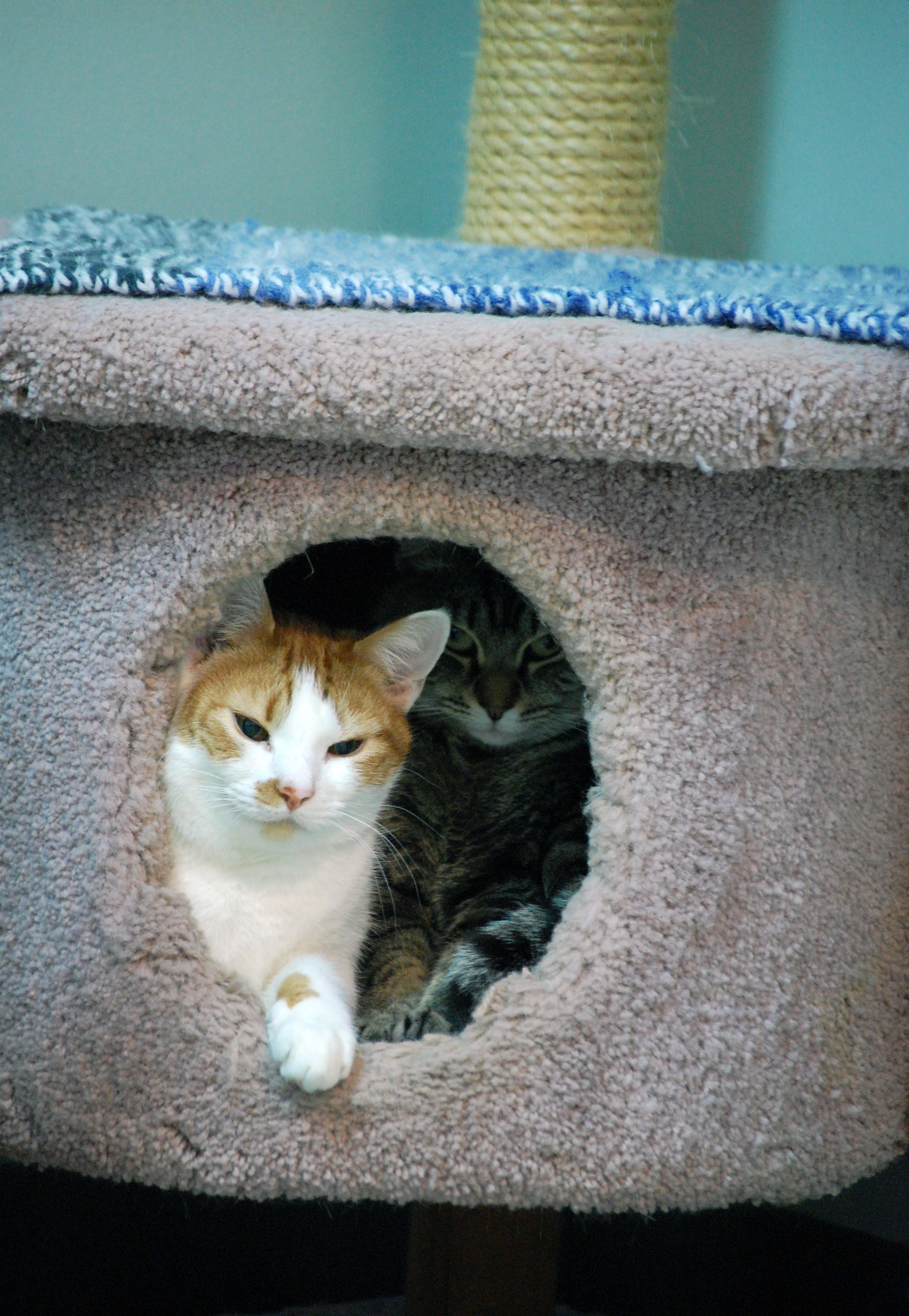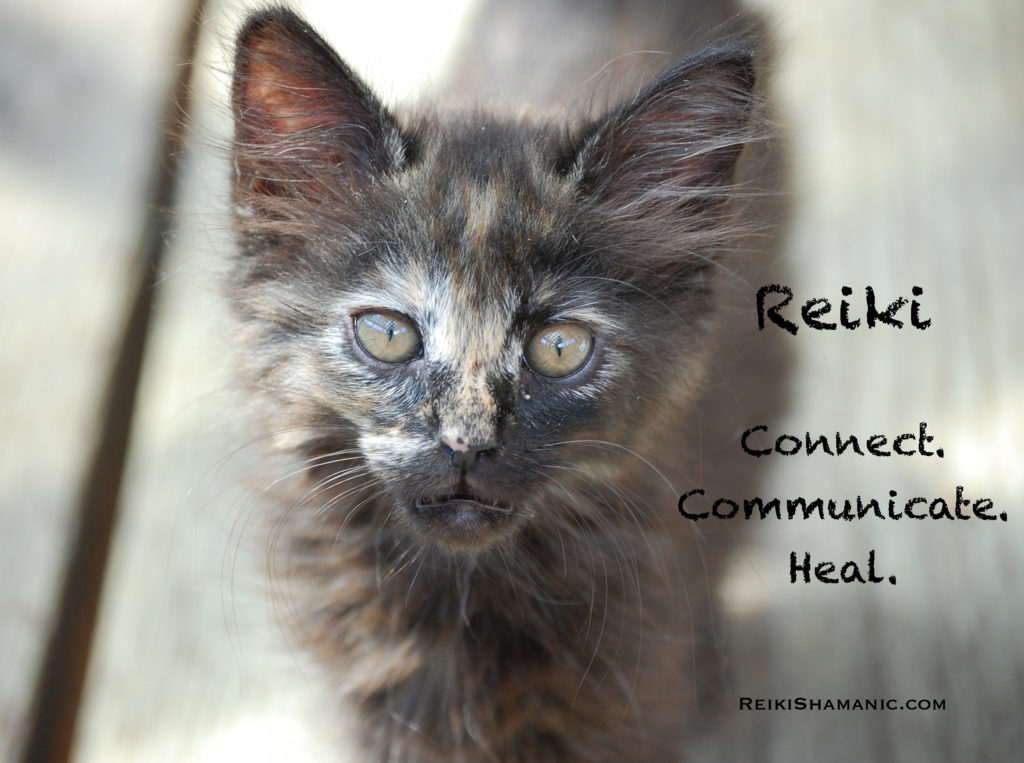
The Shelter Adoption Fee Controversy: What Price Love?
How Much Is that Doggie in the Shelter? by Michele C. Hollow of Pet News and Views raises the question of whether shelters should charge fees, and if so, how much is too much?
Her article sparked a great deal of commentary, and as a animal services professional and recent adopter of kitten Bagheera (pictured with this article) I felt I had an additional perspective worth sharing.
Shelters do not usually charge the full amount it costs to house, feed, spay/neuter, and other health care options they may offer for all the animals they rescue. Having seen the inside of more than a few shelters, they are barely holding their own, never mind making a profit. In dire need of updating, their rundown appearance puts them at risk of being labeled as low-rent warehouses for animals. And usually, this is due to a shortfall of funds, not a lack of desire.
Based on what I have observed in my healing and teaching practice people should pay a fee to adopt. You are not buying affection when you adopt an animal any more than you are buying energy when you learn Reiki or receive a session; the session fee honors the time, expenses and skill that goes into making that service available to you, and the adoption fee honors the same effort on the part of the shelter.
When you adopt you also sign a legal contract. By doing so you are making a physical and energetic agreement, not only with the shelter, but also with the animal that you have chosen. You are committing to offer the very best quality of life for their lifetime that you can. I’m sure this statement will be controversial, but I believe that the fact that anyone might be offended either by the amount or the existence of an adoption fee is more about their emotional issues than it is about the shelters or the welfare of the animals.
For a moment let’s compare shelters to car factories. When we purchase a car we expect to pay for it and have it run well for a number of years. If the manufacturer uses shoddy materials, has a poor quality factory and cannot afford to hire quality workers you will not be purchasing a quality product—and the lifetime of your car will be compromised. Shelters face similar challenges, some can only offer the basics such as food (albeit poor quality) and shelter (a roof is better than no roof at all). There is little left over to offer for testing or even basic medical care. If they had more funds they would be better able to support the desire of the adopter for a healthy companion as well as the needs of the animal.
Now, animals are not cars, they are feeling sentient beings who need love and understanding as well as routine maintenance (quality food, water, veterinary support, complementary therapies, etc.). However the cost of routine maintenance can add up for an animal as well as it can for a car. Anyone who can afford the sticker price, can purchase a car. If, after purchasing, the car buyer chooses to waive quality routine maintenance only their pocketbook suffers, which is not true of their animal companion.
No one should be allowed to adopt an animal that is not willing, or able, to offer that animal all the support that is needed for a quality life. Having an animal companion is not a right, but a responsibility. And if you cannot afford, or are not willing, to pay the relatively minor costs upfront for the services of the shelter, then you are not a good candidate for offering quality care for the lifetime of a companion animal. The issue of whether to charge or how much should not be about the emotional needs, desires, or financial hardship of the prospective adopter, but the mental, emotional, physical and spiritual needs of the animal being adopted.
How Much Is that Doggie in the Shelter? mentions a study in the Journal of Applied Animal Welfare Science, Oct. 12, 2009, by Weiss E. and Gramann S. which found, “A comparison of attachment levels of adopters of cats: fee-based adoptions versus free adoptions suggest that no significant differences were found.” I might question whether the study included how the animal was cared for. There is no way to measure accurately the relationship between fee and feelings but you can measure the level of care. Adopting an animal should require a potential adopter to jump through some hoops. The willingness to do so offers some measure of protection to the animal, some indication of how they may be treated over their lifetime, and an opportunity to educate the adopter.
Shelter fees should be high enough to cover all costs and overhead, just like any other business, and should have enough margin built in so that they can focus on the one thing that can improve life for everyone—education. Perhaps, through the efforts of shelters and many unsung volunteers, one day we will no longer have a pet overpopulation problem, with more animals available than there are quality homes. Perhaps in future, animals, and the unconditional love they offer, will then be appreciated for the priceless gifts they are.
>>>>>>
SHARE THIS ARTICLE
You are welcome to share this article with others by email, on your blog or to your mailing list so long as you leave it intact and do not alter it in any way. All links must remain in the article. And, you must include the copyright notice and the bio.
©2011 Rose De Dan. All Rights Reserved. www.reikishamanic.com
A WILD WAY TO HEAL
Rose De Dan, Wild Reiki and Shamanic Healing LLC, is an animal communicator, Reiki Master Teacher, shamanic energy healer, and author. Her classes, sessions and ceremonial work are inspired by wild and domestic animals who have issued a call to action for personal and global healing.
Her book Tails of a Healer: Animals, Reiki and Shamanism features heartwarming stories about animals and their role in her evolution as an energy worker and shamanic healer.





Thanks for mentioning my article at Pet News and Views. You did a great job too! So many people don’t realize the cost of care for a shelter animal.
It’s an interesting topic… Can’t tell you how many folks I’ve head who have complained about the expense they’ve “sunk into” theis pets – many, but not all, who are “purebred” owners.
(As Alexandra Horowitz notes in her book, ‘Inside of a Dog’, the words “pets” and “owners” are used loosely here).
I adopted my “free” dog, Dasher in 2001, and was dismayed at the price of a “free” dog at first. But there was no question once she came home that no expense on her was wasted.
I am fortunate that 11 years later she has remained healthy – as has her sib Bella who joined us a year after Dasher’s arrival.
Over the years I have been fortunate to bond with other families of rescue dogs, rescue groups, ad hoc rescue volunteers, and dog (and other animal) lovers of all kinds who understand that all life is important, and that any opportunity to give back does not come at a monetary cost.
The stories are touching but too numerous to account here, so let’s just chalk up one for those among humanity who have answered the call in the name of animal care,and who work together to get others to understand the importance and implications of animals and their treatment to human society as a whole.
While I understand the profound pull of wanting to bring an animal into your family, it just isn’t always in the animal’s best interests. I used to believe an animal being fed and alive was always better than an animal being dead. I no longer think that.
In the case of a shelter that kills animals, a free adoption might mean the furry one would live longer, but likely suffer more and often die more horribly. I’m not convinced that’s a compassionate trade-off. Here’s why:
Placing the animal with someone who can’t afford the equivalent of one visit to the vet means the animal probably (maybe) gets fed and manages to live… but only until it gets seriously sick (as 99% of beings inevitably do)or hit by a car or attacked by a dog or parasitized by heart-worms or…
At which time, unless the person has somehow come up in the world, he very likely can’t afford the vet’s fees or the antibiotics or the lab work or the x-rays or the surgery the animal desperately needs. So then what? The animal is very likely to not receive needed care; she suffer tremendously, often to a painful,early death. There are few to no foundations to help people pay for veterinary care for their “pets”.
Case in point: someone I know of adopted 2 free cats from a family, and while he loved them dearly, a crisis arose every time they needed care because he had not thought about those expenses before adopting them. He was underpaid and remained so.
Not just unable to pay for quality foods, vet services, and de-worming meds, he had to handle the emotional trauma of seeing one furry family member with multiple broken bones for which he could do nothing except beg others to help. The cat was in desperate ongoing agony; and the human was torn apart emotionally because he was financially helpless to do anything about it (his credit was maxed out). Eventually he even had to choose between surgery and amputation of the cat’s leg (for neither of which he had money).
Had a friend not taken pity on the animals and loaned the man money every time the animals needed care, the cat’s lives – and possible deaths – would have been horrific. Even the loans were apparently problematic, since they took years to pay back, which put a strain on the friendship.
Animals deserve better; we just can’t ethically set our standards for their quality of life so low. Vet bills these days are extremely high, and if someone cannot pay an adoption fee, I doubt they can afford pet insurance.
Money, money, money…
Of course, shelters and rescue groups can’t operate without funding for food, shelter, and medical costs, so of course they have to charge fees along with aggressive fundraising to stay in business.
It would be nice if these places could operate on goodwill alone, but they simply can’t.
Here in the Northeast, many shelters and rescue groups transport animals from the south because it’s easier to get purebred dogs down there. These are more desirable and bring in higher fees than do mutts.
Shelters in NJ with long established no kill policies are no longer able to
maintain them because of the economic crisis – many of the animals in them are pit bulls or pit mixes and are being put down daily because there is not enough space for them, nor funding to care for them even if there were.
Many people do not hesitate to call a shelter to solve their problems (like picking up strays) without even stopping to consider giving a donation. (A word to the wise – if you have a shelter come and pick up feral cats, they may likely immediately euthanize them – cat rescue groups are more apt to have volunteer fosters that will work to socialize them.)
Lastly, on the adoptive homefront, I don’t think requiring pet insurance is a fair proposition. I’ve never had insurance for my pets, nor would I be pleased if that were to become a pet adoption issue in the future. While it’s certainly true that people assume responsibility for a pet’s well-being that could very well involve high medical costs at some point,you can’t dictate how they choose to do so.
As none of you apparently have ever been low income. A animal is not better off dead than with someone like me. My dog was a rescue he would have been killed! He’s amazing and so full of love. Because iam lower income than you I shouldn’t have a animal who by the way is so well loved by my family he sleeps with my daughter. He has all of his shots, food ( maybe not you to your high standerds) flee/tick Meds, heart worm Meds. And if he was injured it would be hard to pay the vet bills. But thankfully the vet would put me on a payment plan. I would do anything for him. He is better off with me then being dead. Snobbery is defently disgusting when you would rather kill a animal than give him to a loving home.